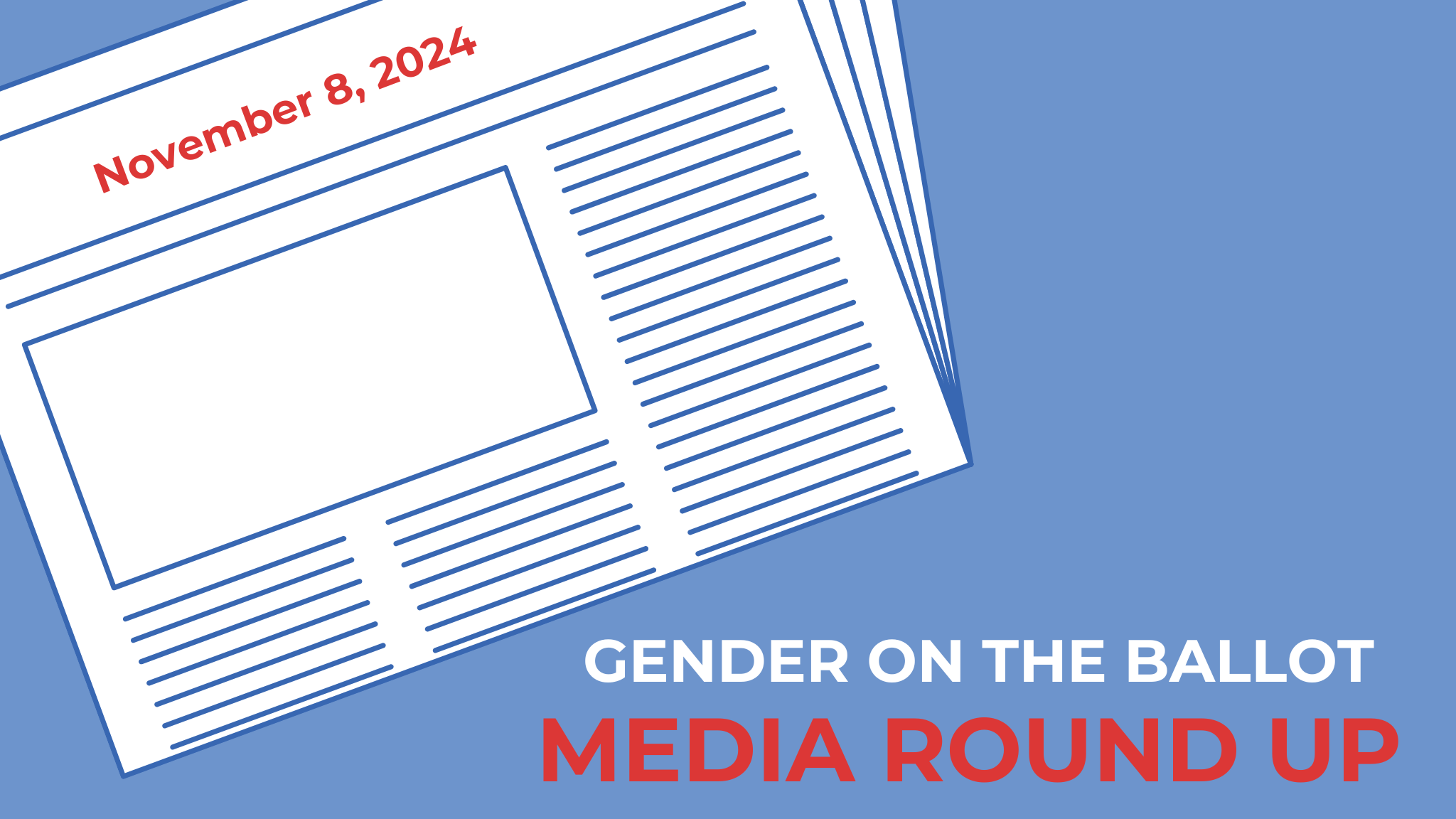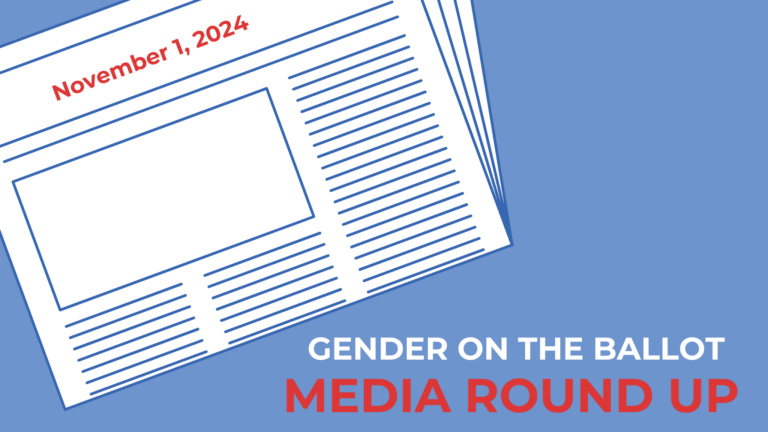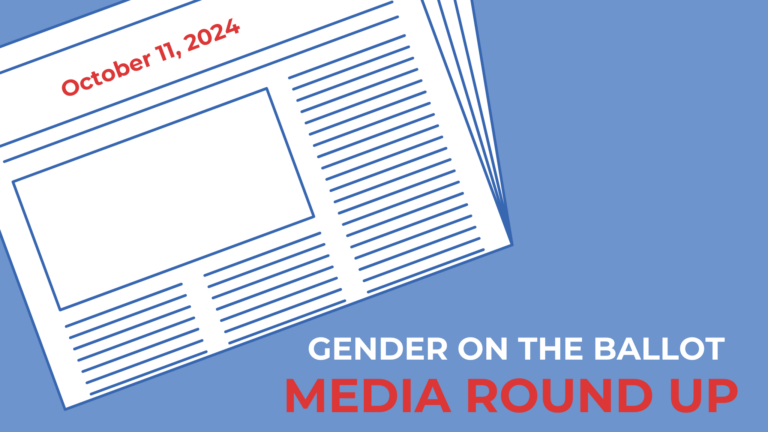Happy Friday! Welcome to our Media Round Up. Each week we’re collecting and sharing our…
Weekly Media Round Up: November 8, 2024

Where We Stand: How to keep up with Emerging Election Results
With 16 races still too close to call, 140 women will serve in the next (119th) Congress, compared to 151 today. Twenty-four will serve in the U.S. Senate, compared to 25 today, with two races too close to call. As election results are finalized, we also know that at least 18 non-incumbent women have been elected to Congress. These new members hail from 13 states. Two are Republicans and 16 are Democrats.
Visit the Center for American Women and Politics (CAWP) to follow these and other key results for women candidates for Congress and statewide executive offices following the 2024 elections. CAWP’s full election results post, Results for Women Congressional and Statewide Executive Candidates in Election 2024, will continue updating until all election results are finalized. It contains data on women in this year’s elections with comparisons to previous records and cycles, breaking data down by party and race. Additionally, CAWP’s 2024 Election Results Tracker will continue updating with the latest data on women who have won their races for congressional and statewide executive offices. For those looking for comprehensive coverage, 19th News has also created a “one-stop shop” for election information, continually updating with new stories, key race information, and historic wins.
New Chief of Staff
President-elect Donald Trump has named senior campaign adviser Susie Wiles as his White House Chief of Staff, making her the first female to hold that position in any adminisration. Wiles, a longtime GOP operative whose political career stretches back to working as former President Ronald Reagan’s campaign scheduler for his 1980 presidential bid, amassed “outsized influence” as one of Trump’s two 2024 campaign managers. In the wake of Trump’s victory, many are now crediting the “professionalization” of his campaign to Wiles’ leadership.
2024 Presidential Election Takeaways
Former President Donald Trump’s reelection to the White House has reaffirmed the practice of electing a man to the nation’s highest office for over 200 years. For many American women, the results “infused bitterness and despair,” while for others, “ideology mattered much more than gender” when deciding how to cast their ballot. Exit polls solidified the notion of a wide gender gap in the support for the two candidates, with women favoring Vice President Kamala Harris by 10 points, and men favoring Trump by the same amount. The margin, however, was slightly smaller than in the 2020 and 2016 presidential elections – White women still by and large broke for Trump, and Trump did better with young women voters than he did in 2020. Exit polls also showed that Black women are still the “backbone of the Democratic party,” as Harris won them by 85 points. Harris’ loss leaves the United States in the same category as most other countries in the world: only 7 percent of the 193 countries that constitute the United Nations have a woman as their head of government.
Historic Firsts and Representation Wins & Struggles
There are several representational wins to celebrate. Lisa Blunt Rochester, Senator-elect from Delaware, and Angela Alsobrooks, Senator-elect from Maryland, have now doubled the number of Black women ever elected to the Senate from two to four. Two Black women have never served in the Senate at the same time, until now. Blunt Rochester becomes Delaware’s first woman, and first Black person, to represent the state in the Senate, and Alsobrooks becomes the first Black woman to represent Maryland in the Senate.
Delaware made even more history with the election of Sarah McBride, SPA/BA ’13, as the first openly transgender person to Congress. McBride, came out as transgender in the American University newspaper in 2012 when she was the outgoing student government president.
Republican women had some notable wins as well, with former Senator Kelly Ayotte making a political comeback and winning the New Hampshire governor’s race bringing the number of women in the role to 13, the largest in history. However, this election cycle also featured letdowns for Democrats and Republicans alike. With Vice President Kamala Harris losing her presidential bid, Black women who led massive get-out-the-vote campaigns across Georgia were upset by her loss but celebrated the historic work they organized, “‘I’m excited that (even) in the middle of losing … we actually made history, that Black women have something to look forward to.’”
Seven States Expand Abortion Protections as Florida Ballot Fails
BBC, Natalie Sherman and Kayla Epstein
Protecting abortion access was on the ballot in ten states this election, and seven passed it. Missouri, Montana, Colorado, New York, Nevada, Maryland, and Arizona all passed amendments to protect or expand abortion rights in their states. South Dakota, Nebraska, and Florida all voted against it. Florida’s loss came as Republican Governor Ron DeSantis campaigned against its passing; despite 57% of the state voting yes, the amendment needed a 60% majority, which it failed to get. Nebraska had two initiatives on their ballot, one being adding an expanded right to abortion in their state’s constitution, and the other being adding their current right to the state constitution. The first measure narrowly failed with 51.2% voting no and 48.8% voting yes, while the second won with 55.3% of the vote. It now adds a ban past twelve weeks, with exceptions for incest, rape, and health of the mother. Reproductive rights advocates celebrate the wins across the seven states, while others regroup in the three failed states.






